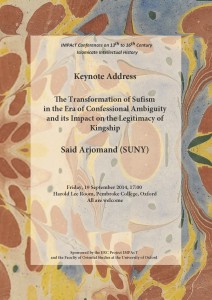Conference on Confessional Ambiguity in the 13th to 16th Century Nile to Oxus Region
Conference on
Confessional Ambiguity, ʿAlid loyalty, and tashayyuʿ ḥasan
in the 13th to 16th Century Nile to Oxus Region
19-20 September 2014, Pembroke College, Oxford
Convened by Judith Pfeiffer
One of the major themes of the later middle and early modern periods of Islamic history is the gradual ‘Shiʿitization’ of large sections of social, intellectual, and political collectivities in the Nile-to-Oxus region. However, rather than re-telling a narrative that leads up to the establishment of Twelver Shiʿism as a state religion in 16th century Iran, and departing from the assumption of a confessional polarization that is largely, if not exclusively, defined by political faultlines, this conference offers an opportunity to address claims about the uniqueness of the Safavid period, putting it into a much broader historical and geographical context, in which there is space for the discussion of alternative and abortive movements, ‘dead-end’ strands of thought, ‘failed’ intellectual agendas and projects without obvious political ambitions, and for those impasses, ventures and movements that, unlike the Safavid enterprise, did not lead up to the formation of a Sufi order-cum-state with a supporting hagiography, historiography, and institutions, but which were, in their very liminality and ephemerality, an important part of the reorganization of the confessional space during this period.
Keynote Address
The Transformation of Sufism in the Era of Confessional Ambiguity
and its Impact on the Legitimacy of Kingship
Said Arjomand (SUNY)
Friday, 19 September 2014, 17:00

Program Friday, 19 September 2014
09:00-09:20 – Registration
09:20-09:30 – Welcome Remarks
Judith Pfeiffer
09:30-11:00 – Panel 1: Confessional Politics in the Ilkhanate
Chair: Kazuo Morimoto
Mahdi or Manjughosa? The non-Islamic Epistemology of Ghazan Khan’s (r. 694-703/1295-1304) Islamic Spiritual Authority
Michael Hope (Australian National University)
Confessional Ambiguity and the Nature of Sovereignty in the Works of Rashīd al-Dīn (d. 718/1318)
Judith Pfeiffer (University of Oxford)
11:00-11:30 – Coffee break and refreshments
11:30-13:00 – Panel 2: Timurid Observers of Confessional Ambiguity
Chair: Devin DeWeese
The Occult Sciences between Sunnism and Shiʿism in Late Timurid Iran
Maria Subtelny (University of Toronto)
Confessional Ambiguity of Ibn ʿInaba’s Ṭālibid Genealogies: Family Pride, Pragmatism, but Little Sectarianism
Kazuo Morimoto (The University of Tokyo)
13:00-14:30 – Lunch break
14:30-16:00 – Panel 3: Spatial Dimensions of Confessional Ambiguity
Chair: Derin Terzioğlu
Imāms, Sayyids, Qalandars, Shahs and Pīrs: The Mapping of Confessional Space in Badakhshan
Jo-Ann Gross (The College of New Jersey Trenton, NJ)
From ‘Confessional Ambiguity’ to the ‘Imperial Shrines’ of Safavid Iran and Mughal India
Azfar Moin (The University of Texas at Austin)
16:00-17:00 – Coffee break and refreshments
17:00 – Keynote Address
The Transformation of Sufism in the Era of Confessional Ambiguity and its Impact on the Legitimacy of Kingship
Said Arjomand (SUNY)
18:30 – Presentations conclude
Program Saturday, 20 September 2014
09:30-11:00 – Panel 4: The Politics of Confessional Ambiguity
Chair: Florian Schwarz
The First Martyr and the Sarbidarids: A Dry Run for Safavid Shiʿism
Robert Gleave (University of Exeter)
Restituting the Political: Qivām al‑Dīn Yazdī and the Confessional Dimensions of Iskandar b. ʿUmar Shaykh’s Political Program
İlker Evrim Binbaş (Royal Holloway, University of London)
11:00–11:30 Coffee break and refreshments
11:30–13:00 – Panel 5: Sufi Entanglements
Chair: Shahzad Bashir
The Paradoxes of Confessional Ambiguity in the Confessional Age: Alid Loyalty and Mainstream Sufism in the Ottoman Empire during the Sixteenth and Seventeenth Centuries
Derin Terzioğlu (Boğaziçi University)
Disciplinary Distinction, Personal Loyalty, and Confessional Experimentation: Patterns in Communal Nomenclature in the Eastern Islamic World, 13th-16th Centuries
Devin DeWeese (Indiana University, Bloomington, IN)
13:00–14:30 Lunch break
14:30-16:00 – Panel 6: Philosophy and Theology
Chair: Maria Subtelny
Theological Topologies Revisited: A Case Study of the Confessional Identity of Jalāl al-Dīn Dawānī (d. 1501) and Ṣadr al-Dīn Dashtakī (d. 1498)
Ahab Bdaiwi (University of St Andrews)
In Praise of Determinacy: Disambiguating the Shiʿism of Mullā Ṣadrā (d. 1635)
Sajjad Rizvi (University of Exeter)
16:00-16:30 – Coffee break and refreshments
16:30-18:30 – Panel 7: Questions and Counterpoints
Chair: Judith Pfeiffer
Ambiguity reloaded. The two guises of an early Safavid historical narrative
Florian Schwarz (Austrian Academy of Sciences, Vienna)
Is it Possible to Write Non-sectarian Islamic History?
Shahzad Bashir (Stanford University, CA)
Closing Remarks
18:30 – Conference concludes
To download the program brochure, please click here for Day 1 and Day 2.
Attendance is free of charge, but spaces are limited and restricted to those who have pre-registered. To register, please email Matthew Reza at matthew.reza@pmb.ox.ac.uk.
To ensure that sufficient refreshments can be provided during breaks, please register by Tuesday, 9 September 2014 at the latest. Any registrations after this date are subject to availability.